| Re: Darwin's Day by OLAADEGBU(m): 6:50pm On May 16, 2012 |
One Nation Under Darwin? 
|
| Re: Darwin's Day by DeepSight(m): 2:47pm On May 17, 2012 |
We really need to start a campaign to stop Olaadegbu from posting silly cartoons. Please, I am begging you Ola, its childish: so many people have told you and you wont listen, it makes you come across like a 5 year old. This is why I dont think I have ever read any post yuou have ever made on this forum. Its difficult to take you seriously. Stop the cartoons for heaven's sake. |
| Re: Darwin's Day by OLAADEGBU(m): 5:53pm On May 17, 2012 |
Deep Sight:
We really need to start a campaign to stop Olaadegbu from posting silly cartoons. Please, I am begging you Ola, its childish: so many people have told you and you wont listen, it makes you come across like a 5 year old. This is why I dont think I have ever read any post yuou have ever made on this forum. Its difficult to take you seriously. Stop the cartoons for heaven's sake. What's wrong with a 5 year old's cartoon? At least it was on the topic unlike your posts that have been off topic. It is different strokes for different folks. If you don't like or understand the cartoons you can ask what relevance to the topic it makes. To me the cartoons speaks more than the epistles folks like you make before you can pass your ideas along, not everyone has the time to read more than a few lines all the time except it is relevant to the topic at hand. |
| Re: Darwin's Day by jayriginal: 9:38pm On May 29, 2012 |
Finally, Flew says, “the argument to Intelligent Design is enormously stronger than it was when I first met it.” I am surprised that such a noted philosopher cannot see the fatal flaws in the Intelligent Design argument, as exemplified by Michael Behe’s “irreducible complexity”11 and William Dembski’s “design inference.”12 They assert that a complex system can only arise out of something with high intelligence. Although complexity is difficult to define, we can reasonably expect a highly intelligent entity to be highly complex. Thus, it can only have arisen out of something even more intelligent and complex, in infinite regress. It’s Intelligent Designers all the way down, not Aristotle’s first cause, as Flew seems to think.
Fortunately, we can avoid an infinite regress. We can just stop at the world. There is no reason why the physical universe cannot be it’s own first cause. As we know from both everyday experience and sophisticated scientific observations, complex systems develop from simpler systems all the time in nature—with not even low intelligence required. A mist of water vapor can freeze into a snowflake. Winds can carve out great cathedrals in rock. Brontosaurs can evolve from bacteria.
And our relatively complex universe could have arisen out of the entity that is the simplest and most mindless of all—the void.
http://www.secularhumanism.org/library/fi/stenger_25_2.html
 Just to annoy Deep Sight a little, your pal, Prof Stenger. |
| Re: Darwin's Day by jayriginal: 10:04pm On May 29, 2012 |
Stenger again. Quite interesting this one.
The Other Side of Time (2000)
Victor J. Stenger
University of Hawaii
In The Creator and the Cosmos: How the Greatest Scientific Discoveries of the Century Reveal God, physicist Hugh Ross gives the following "proof of creation":
"The universe and everything in it is confined to a single, finite dimension of time. Time in that dimension proceeds only and always forward. The flow of time can never be reversed. Nor can it be stopped. Because it has a beginning and can move in only one direction, time is really just half a dimension. The proof of creation lies in the mathematical observation that any entity confined to such a half dimension of time must have a starting point of origination. That is, that entity must be created. This necessity for creation applies to the whole universe and ultimately everything in it."(Ross 1995, 80)
This claim is based on the ancient kaläm cosmological argument, which has been used in recent years by theistic philosopher William Lane Craig during his frequent debates on the existence of God and by many other theistic debaters who follow his lead. Craig states the argument as a simple syllogism (Craig 1979):
(1) Whatever begins has a cause.
(2) The universe began to exist.
(3) Therefore, the universe has a cause.
Ross interprets that cause as the creation.
Note that Craig is not saying that everything must have a cause, which is a frequent misinterpretation. Only something with a beginning is supposed to require a cause. However, he gives no reason for (1) other than a kind of "metaphysical intuition."
While (1) can be challenged on a number of fronts, let me just mention one rebuttal that has been made from physics. Quantum electrodynamics is a fifty-year-old theory of the interactions of electrons and photons that has made successful predictions to accuracies as great as twelve significant figures. Fundamental to that theory is the spontaneous appearance of electron-positron (anti-electron) pairs for brief periods of time, literally out of "nothing." Thus we have a counter example to statement (1), something that begins without cause.
However, one might still argue that the quantum process, though random, is still a causal one. Rather than engage in a semantic dispute on this, let me move to statement (2) of the kaläm syllogism and attempt to show that the universe did not necessarily have a beginning. This will also serve to rebut another theist claim:
Ross also uses the kaläm argument to counter the common atheist taunt: "Who created God?" He claims that God is not confined to a "half dimension" of time, and so need not have been created. I take this to mean that if I can demonstrate the universe is not necessarily confined to a half dimension, then Ross, Craig, and other theists who use the kaläm argument will be forced to admit that the universe was not necessarily created. (Of course they won't).
For this purpose, it should be adequate for me to provide a scenario in which the universe occupies both halves of the time axis. I do not feel compelled to prove that this scenario is true, just show how this is possible within the framework of existing knowledge.
My scenario is provided by inflationary big bang cosmology. Ross, Craig, and I agree that the big bang is strongly supported by astronomical observations. Inflation remains less firmly established, but remains the only current theory that successfully explains a wide range of observations. Furthermore, the model is falsifiable, and so maintains good scientific credentials. Indeed, with the 1992 COBE observation of a 1/100,000 fluctuation in the temperature of the cosmic microwave background, inflation passed at least one risky falsification test.
Suppose the universe was at some point in time completely empty of matter, radiation, or energy of any type. It was about as nothing as nothing can be, a void. Physicists can still describe the void in terms of general relativity. It is completely flat geometrically, with space and time axes that run from minus infinity to plus infinity. Anything else and matter, radiation, or spacetime curvature would have to exist and this universe would no longer be a void.
In the absence of matter and radiation, Einstein's equations of general relativity yield the de Sitter solution, which simply expresses the curvature of space as proportional to the cosmological constant. When the universe is flat, this term is zero and the equation then reads: 0 = 0. This denotes the void.
This is the way things would have stayed were it not for quantum mechanics, which we can also apply to an empty void. The uncertainty principle allows for the spontaneous, uncaused appearance of energy in a small region of space without violating energy conservation . If that energy appears as matter (that is, rest energy) or radiation (kinetic energy of massless particles like photons), then it will have to disappear in a short time interval to maintain energy conservation. This can be expected to happen randomly throughout the spacetime void, with no significant permanent result.
However, another possibility exists that can lead to a quite significant and permanent result. The fluctuation energy can appear instead as spacetime curvature within this tiny region, which is called a "bubble of false vacuum." This bubble still contains no matter or radiation, but is no longer a "true vacuum" because of the curvature, as expressed by a non-zero cosmological constant. According to the de Sitter solution, the bubble will expand exponentially in what is called inflation.
The energy density is constant for a brief interval of time. As the volume of the bubble increases exponentially during that interval, the energy contained within also increases exponentially. Although the first law of thermodynamics may seem to be violated, it is not. The pressure is negative and the bubble does work on itself as it expands. By the time it has inflated to the size of a proton, in perhaps 1042 second, the bubble contains sufficient energy to produce all the matter in the visible universe today. Frictional processes (this is all in the equations--see Stenger 1990) bring inflation to a halt, particle production begins, and the familiar Hubble expansion of the big bang takes over.
We can label as t = 0 the time at which the initial quantum fluctuation takes place. The expansion then proceeds on the positive side of the t-axis, as defined by the increasing entropy on that side. As first suggested by Boltzmann a century ago, the direction of time is by definition the direction in which the entropy of the bubble universe increases.
Now, what about the negative side of the t-axis, the other half dimension? If we look at Einstein's equations, nothing forbids an expansion in that direction as well. Physicists usually simply ignore that solution because most share Ross's prejudice, expressed above, that time "proceeds only and always forward." But the equations of classical or quantum physics, including those of general relativity, make no fundamental distinction between the two time directions. Where that distinction appears, it is put in by hand as a boundary condition.
However, a completely time-symmetric solution of Einstein's equations for the vacuum will give exponential inflation on both sides of the time axis, proceeding away from t = 0 where the initial quantum fluctuation was located. This implies the existence of another part of our universe, separated from our present part along the time axis. From our point of view, that part is in our deep past, exponentially deflating to the void prior to the quantum fluctuation that then grew to our current universe. However, from the point of view of an observer in the universe at that time, their future is into our past--the direction of increasing entropy on that side of the axis. They would experience a universe expanding into their future, just as we experience one expanding into our future.
Would these different parts of the universe be identical, kind of mirror images of each other? Not unless physics is completely deterministic, which we do not believe to be the case. The two parts would more likely be two very different worlds, each expanding in its own merry way, filled with all the other random events that lead to the evolution of galaxies, stars, and perhaps some totally different kind of life.
This scenario also serves to explain why we experience such a large asymmetry in time, while our basic equations do not exhibit an asymmetry at all. Fundamentally, the universe as a whole is time-symmetric, running all the way from minus eternity to plus eternity with no preferred direction, no "arrow" of time. Indeed, the whole notion of beginning is meaningless in a time-symmetric universe. And, without a beginning, the kaläm cosmological argument for a creator fails because of the failure of step (2) in Craig's syllogism.
I have described a scenario for an infinite, eternal, and symmetric universe that had no beginning. The quantum fluctuation occurs at one particular spatial point in an infinite void. Obviously it could have happened elsewhere in this void as well. This multiple universe scenario is exactly what is suggested by the chaotic inflationary model of Andre Linde. While multiple universes are not required to deflate the kaläm argument, they can be used to provide a scenario by which the so-called anthropic coincidences may have arisen naturally. Again, this scenario cannot be proven, just presented as a possibility that provides a non-supernatural alternative to the theistic creation. For more discussion and further references, see Stenger (1999).
Finally, by showing that the universe did not necessarily have a beginning, we can counter another common theist line of argument used whenever the claim is made that a spontaneous "creation" violates no known physics. The theist will say, "Where did physics come from?" If their imagined God did not have to come from something, because she had no beginning, then neither did physics.
http://www.infidels.org/library/modern/vic_stenger/otherside.html
|
| Re: Darwin's Day by OLAADEGBU(m): 11:33pm On May 29, 2012 |
Back to the topic on hand. Did Darwin Renounce Evolution on His Deathbed?
by John D. Morris, Ph.D.
The story has circulated for decades. Charles Darwin, after a career of promoting evolution and naturalism, returned to the Christianity of his youth, renouncing on his deathbed the theory of evolution. The story appears to have been authored by a "Lady Hope," and relates how she visited him near the end and received his testimony.
Evolutionists in general and his surviving family in particular have disputed the account. Those with him at the time insist there was no evident changing of mind. Indeed, in his autobiography written late in his life, Darwin fully supported evolution. He admitted the concept was distasteful to him and had brought him much dismay, but he still held it.
Lady Hope was real, the wife of Lord Hope. She was a fervent Christian and friend of Darwin's wife, also a strong Christian who prayed for and witnessed to him all their married life, to no avail according to him. Nevertheless, many have researched the story, and all have concluded it is probably an "urban myth."
In his later years Darwin did soften in his attitude toward Christianity. He even allowed a local church to hold their meetings on his property, and asked that his bedroom windows be opened so he could hear the hymns being sung. A Christian can only hope that the seeds planted earlier took root at the end, and that he did place his faith in Christ before he died.
A similar scenario took place more recently with the death of the great spokesman for evolution and atheism, Carl Sagan. He received strong witness of Christianity from many people; most notably ICR's physics chairman Dr. Larry Vardiman. They corresponded for years, during which God's plan of salvation and the evidence for creation were clearly discussed. Dr. Sagan fully understood the salvation message but specifically refused it. He said he wished he could believe, but was convinced evolution was true and there was no God. He contracted cancer and passed into eternity in 1996.
His wife, Ann Druyan, herself an avowed anti-Christian, takes a different tack, however. She takes great pains to insure that no one writes an "urban myth" about her husband. She reportedly organized a vigil at his bedside to make sure no Christian came near. No last-minute prayer, no final testimony was allowed.
Again, a Christian can only trust in the grace of our loving Lord and wonder if the seeds planted took root before it was too late. There is no joy for a Christian if anyone, even a lifelong opponent of the cross, slips into a Christless eternity.
* Dr. John D. Morris is the President of the Institute for Creation Research.
For more . . . .
|
| Re: Darwin's Day by jayriginal: 12:40pm On May 30, 2012 |
On the singularity and the laws of physics,
It is this point which is referred to by physicists as the initial cosmological singularity. This singularity is a point at which all the matter of our universe is compressed in an instant of one dimensional space. It is an endpoint without causal or temporal antecedents, existing as a literal border of space time. As a consequence of its inability to be described within the conventions of classical spacetime relations, the singularity is a point at which all the known laws of physics break down. As a consequence of its lawlessness, the singularity is inherently unpredictable, any configuration of particle emissions just as likely as any other. The explosion of this singularity into the present expansionary phase of the universe is what is referred to as the Big Bang.
The inherent lawlessness and unpredictability of the singularity has not fared well with many physicists, most notably the author of general relativity theory himself, Albert Einstein. Einstein found it difficult to accept the indeterministic implications of the singularity and its inherent unpredictability. As physicist George Smoot recalls,
One reason why Einstein initially rejected this implication of his general relativity theory was that, if the universe is currently expanding, then long ago it must have started from a single point. All space and time would have been bound up in that 'point', an infinitely dense, infinitely small 'singularity'. Hence it would be impossible to calculate what happened 'before' the singularity, as any calculations would yield nonsensical results. The singularity would be the ultimate barrier to human knowledge, and this struck Einstein as absurd.
Einstein did everything he could to avoid the singularity, including a failed mathematical attempt at eliminating the dynamic properties of the universe within the paradigm of general relativity. Using an arbitrary and ad hoc cosmological constant he was immediately forced to abandon, Einstein let his own metaphysical prejudices interfere with the acceptance of his own theory.
http://www.infidels.org/library/modern/greg_scorzo/kalam.html#2
|
| Re: Darwin's Day by OLAADEGBU(m): 12:59pm On May 30, 2012 |
Back to the topic on hand. Religion-Free Group Says to 'Praise Darwin'
by Christine Dao *
How much sense does this make?
An organization that bills itself as a promoter of “freedom from religion” posted billboards bearing the words “Praise Darwin: Evolve Beyond Belief” in several U.S. cities to coincide with the British naturalist’s 200th birthday. Cities where the Freedom from Religion Foundation (FFRF) placed the advertisements include Dayton, Tennessee, and Dover, Pennsylvania—homes of the 1925 Scopes “Monkey Trial” and the highly politicized 2005 Dover Trial, respectively.
The Wisconsin-based foundation, which put up a Grinch-like sign next to a nativity scene in the Washington State Capitol during the 2008 Christmas season,1 has apparently mistaken the meaning of the word “praise” in the same way as it misunderstood the historical significance and application of the phrase “separation of church and state.”
The Greek verb for “praise” is aineō, which in the New Testament always refers to the praise of God. This definition predates the word’s Latin derivative from which English gets “price” and “prize.” In essence, to praise something is to ascribe a great deal of value to it. It’s a term often used synonymously with “worship,” the reverent honor and homage paid to God.
So why is a group of “freethinkers” inviting everyone to pay reverent homage to a man who was by no means a god, especially when it acknowledges no god or religion in the first place? The billboards’ stated purpose is to mitigate evolution’s “bad rap” in the United States.2 Forget about what the scientific evidence says regarding evolution’s lack of proof.
Darwin, as careful an observer and prolific a writer as he was in his day, created not one law or physical attribute in nature. He never endured the scourge of the 39 lashes or spilt his blood on a Roman cross for the sake of his people. As far as we know, he’s still buried in Westminster Abbey, not seated bodily at the right hand of God interceding on our behalf. And he hasn’t promised to return to right all wrongs once and for all.
So, for what should we praise Darwin?
For more . . . .
Or rather, for who should atheists praise or be thankful to? |
| Re: Darwin's Day by jayriginal: 2:08pm On May 30, 2012 |
^^ Perhaps you have mistaken the meaning of "praise" as you say others have. Anyway back to notes.
This consistency obtains, since in order to show that it is metaphysically possible that the universe comes to be without a cause, it is not necessary to show it is metaphysically possible that each thing comes to be without a cause in any situation whatsoever. It is sufficient to show that in one possible situation one thing comes to be without a cause and that every other thing is an immediate or remote effect of this one thing. For illustrative purposes, we may take the notion of "the big-bang singularity" from classical or standard hot big-bang cosmology. A finite universe is here thought of as beginning with a physical singularity that is spatially pointlike (i.e., has zero spatial dimensions), that exists for one instant only and that is not governed by any physical laws. The cosmologist Michael Berry writes that at the first instant of time "there is a finite amount of matter and radiation packed into zero initial proper volume; this 'point', however, includes the whole of space-there is nothing 'outside'."8 This point explodes in a "big bang," but this explosion is not governed by any physical law. Paul Davies writes of this singularity: "Anything can come out of a naked singularity-in the case of the big bang the universe came out. Its creation represents the instantaneous suspension of physical laws, the sudden, abrupt flash of lawlessness that allowed something to come out of nothing." The big-bang singularity explodes and becomes a three-dimensional volume of space filled with interacting particles and the universe henceforth evolves in a causally sequential manner.
The fact that the singularity gives rise to a three-dimensional space with matter does not imply that it is a physical law that the singularity give rise to something. There is no physical law in classical big-bang cosmology of the form "If there is a singularity, it must give rise to something at a later time." The singularity in fact gives rise to something, but this fact is unpredictable given the nature of the singularity itself. For example, there is no dispositional property of the instantaneous spatial point that manifests a physical tendency to explode into something else; the singularity could just as well have been followed by nothingness (more precisely put, it could have been the case, consistently with all the laws of classical big-bang cosmology, that the only instant that exists is the instant of the singularity).
Since no physical laws govern the singularity, it is the case that if it gives rise to something at a later time, it is most likely to give rise to random or arbitrary particle configurations (giving an overall state of maximal disorder) and is not likely to give rise to a highly ordered system such as a flower or ant. This, however, is not a physical law that governs the singularity, but is a probability calculation that is based on the fact that no physical law governs the singularity.
I do not want to endorse the claim that each thing but the big-bang singularity comes to be only if it has a cause; I have merely argued that it is possible for the universe to come to be uncaused if this is true. However, I will show how principle (P) can be made plausible. If there is a relevant difference between the big-bang singularity and other things, then (P) will be plausible.
There are two relevant differences, the first being that the singularity is the only thing whose coming to be is not governed by any laws. Each thing that exists later than the big-bang singularity, each particle, organism, etc., is governed by some laws (e.g., the super-symmetry laws, Darwinian laws, etc.). Since definitions of causality often make explicit or implicit reference to laws, it is natural to suppose that, if there is only one completely lawless thing, this thing will also be the only thing exempt from causality.
Second, the big-bang singularity is the simplest possible thing; it has zero spatial dimensions (it is pointlike), zero temporal dimensions (it is instantaneous) and is governed by zero laws. It is plausible that if only one thing can come to be without a cause, this thing will be the simplest possible thing. If this is the case and (P) is true, then the theory that the universe begins with a big-bang singularity will reflect the only metaphysically possible way in which a universe can come to be uncaused.
http://www.infidels.org/library/modern/quentin_smith/cause.html
PS: Article Edited. |
| Re: Darwin's Day by jayriginal: 2:17pm On May 30, 2012 |
Why the Big B@ng is No Help to Theists
Quentin Smith
Since the mid-1960s, scientifically informed theists have been ecstatic because of Big B@ng cosmology. Theists believe that the best scientific evidence that God exists is the evidence that the universe began to exist in an explosion about 15 billion years ago, an explosion called the Big B@ng. Theists think it obvious that the universe could not have begun to exist uncaused. They argue that the most reasonable hypothesis is that the cause of the universe is God. This theory hinges on the assumption that it is obviously true that whatever begins to exist has a cause.
The most recent statement of this theist theory is in William Lane Craig's 1994 book Reasonable Faith.[1] In it Craig states his argument like this:
Whatever begins to exist has a cause.
The universe began to exist.
Therefore, the universe has a cause.[2]
In a very interesting quote from this book he discusses the first premise and mentions me as one of the perverse atheists who deny the obviousness of this assumption:
The first step is so intuitively obvious that I think scarcely anyone could sincerely believe it to be false. I therefore think it somewhat unwise to argue in favor of it, for any proof of the principle is likely to be less obvious than the principle itself. And as Aristotle remarked, one ought not to try to prove the obvious via the less obvious. The old axiom that "out of nothing, nothing comes" remains as obvious today as ever. When I first wrote The Kalam Cosmological Argument, I remarked that I found it an attractive feature of this argument that it allows the atheist a way of escape: he can always deny the first premise and assert the universe sprang into existence uncaused out of nothing. I figured that few would take this option, since I believed they would thereby expose themselves as persons interested only in academic refutation of the argument and not in really discovering the truth about the universe. To my surprise, however, atheists seem to be increasingly taking this route. For example, Quentin Smith, commenting that philosophers are too often adversely affected by Heidegger's dread of "the nothing," concludes that "the most reasonable belief is that we came from nothing, by nothing, and for nothing" - a nice ending to a sort of Gettysburg address of atheism, perhaps.[3]
A Baseless Assumption
I'm going to criticize this argument from scientific cosmology, which is the most popular argument that scientifically informed theists and philosophers are now using to argue that God exists.
Let's consider the first premise of the argument, that whatever has a beginning to its existence must have a cause. What reason is there to believe this causal principle is true? It's not self-evident; something is self-evident if and only if everyone who understands it automatically believes it. But many people, including leading theists such as Richard Swinburne, understand this principle very well but think it is false. Many philosophers, scientists, and indeed the majority of graduate and undergraduate students I've had in my classes think this principle is false. This principle is not self-evident, nor can this principle be deduced from any self-evident proposition. Therefore, there's no reason to think it's true. It is either false or it has the status of a statement that we do not know is true or false. At the very least, it is clear that we do not know that it is true.
Now suppose the theist retreats to a weaker version of this principle and says, "Whatever has a beginning to its existence has a cause." Now, this does not say that whatever has a beginning to its existence must have a cause; it allows that it is possible that some things begin to exist without a cause. So we don't need to consider it as a self-evident, necessary truth. Rather, according to the theists, we can consider it to be an empirical generalization based on observation.
But there is a decisive problem with this line of thinking. There is absolutely no evidence that it is true. All of the observations we have are of changes in things - of something changing from one state to another. Things move, come to a rest, get larger, get smaller, combine with other things, divide in half, and so on. But we have no observation of things coming into existence. For example, we have no observations of people coming into existence. Here again, you merely have a change of things. An egg cell and a sperm cell change their state by combining. The combination divides, enlarges, and eventually evolves into an adult human being. Therefore, I conclude that we have no evidence at all that the empirical version of Craig's statement, "Whatever begins to exist has a `cause'," is true. All of the causes we are aware of are changes in pre-existing materials. In Craig's and other theists' causal principle, "cause" means something entirely different: it means creating material from nothingness. It is pure speculation that such a strange sort of causation is even possible, let alone even supported in our observations in our daily lives.
An Uncaused Universe
But the more important point is this: not only is there no evidence for the theist's causal assumption, there's evidence against it. The claim that the beginning of our universe has a cause conflicts with current scientific theory. The scientific theory is called the Wave Function of the Universe. It has been developed in the past 15 years or so by Stephen Hawking, Andre Vilenkin, Alex Linde, and many others. Their theory is that there is a scientific law of nature called the Wave Function of the Universe that implies that it is highly probable that a universe with our characteristics will come into existence without a cause. Hawking's theory is based on assigning numbers to all possible universes. All of the numbers cancel out except for a universe with features that our universe possesses, such as containing intelligent organisms. This remaining universe has a very high probability - near 100% - of coming into existence uncaused.
Hawking's theory is confirmed by observational evidence. The theory predicts that our universe has evenly distributed matter on a large scale - that is, on the level of super-clusters of galaxies. It predicts that the expansion rate of our universe - our universe has been expanding ever since the Big B@ng - would be almost exactly between the rate of the universe expanding forever and the rate where it expands and then collapses. It also predicts the very early area of rapid expansion near the beginning of the universe called "inflation." Hawking's theory exactly predicted what the COBE satellite discovered about the irregularities of the background radiation in the universe.[4]
So scientific theory that is confirmed by observational evidence tells us that the universe began without being caused. If you want to be a rational person and accept the results of rational inquiry into nature, then you must accept the fact that God did not cause the universe to exist. The universe exists uncaused, in accordance with the Wave Function law.
Now Stephen Hawking's theory dissolves any worries about how the universe could begin to exist uncaused. He supposes that there is a timeless space, a four-dimensional hypersphere, near the beginning of the universe. It is smaller than the nucleus of an atom. It is smaller than 10-33 centimeters in radius. Since it was timeless, it no more needs a cause than the timeless god of theism. This timeless hypersphere is connected to our expanding universe. Our universe begins smaller than an atom and explodes in a Big B@ng, and here we are today in a universe that is still expanding.
Is it nonetheless possible that God could have caused this universe? No. For the Wave Function of the Universe implies that there is a 95% probability that the universe came into existence uncaused. If God created the universe, he would contradict this scientific law in two ways. First, the scientific law says that the universe would come into existence because of its natural, mathematical properties, not because of any supernatural forces. Second, the scientific law says that the probability is only 95% that the universe would come into existence. But if God created the universe, the probability would be 100% that it would come into existence because God is allpowerful. If God wills the universe to come into existence, his will is guaranteed to be 100% effective.
So contemporary scientific cosmology is not only not supported by any theistic theory, it is actually logically inconsistent with theism.
http://www.secularhumanism.org/library/fi/smith_18_2.html
|
| Re: Darwin's Day by jayriginal: 4:03pm On May 30, 2012 |
Can Something Come from Nothing?To most people, the claim that something cannot come from nothing is a truism. However, most physicists disagree. Against the claim, they often cite what are variously known as quantum vacuum fluctuations or virtual particles. These are particle-antiparticle pairs that come into existence in otherwise empty space for very brief periods of time, in agreement with the Heisenberg uncertainty relations. [Q1] [Q2] They produce measurable effects, such as the Lamb shift and the Casimir-Polder force.[Q3] [Q4] These particles are not anomalies; they are so common that some physicists argue that if we think of empty space as nothing, then there is no such thing as nothing, because space never is empty—it is always filled with virtual particles.[Q5] In short, if we follow most people in thinking of empty space as nothing, then we have at least one pervasive example of something that can come from nothing.
Can the Universe Come from Nothing?Virtual particles are constrained to have short lives because they represent an increase in the energy of the universe; Heisenberg's uncertainty principle affords room for sufficiently short-lived virtual particles, but long-lived ones appearing in a universe such as ours would violate the first law of thermodynamics. One might think, then, that quantum vacuum fluctuations cannot have any relevance for the origin of the universe. On the contrary, some physicists, going back at least to Tryon (1973) believe that the entire universe might be a massive quantum vacuum fluctuation.[Q6] The key feature of the universe that would make this possible would be a total energy of zero. You might wonder how the universe could have a total energy of zero. The answer is that gravitational energy is negative—when summed with the positive energy of the matter in the universe, the two quantities may cancel out.[Q7] [Q8] Neither Heisenberg's uncertainty principle, nor the first law of thermodynamics, place any limit on the length of time a quantum vacuum fluctuation of zero total energy could persist, so the longevity of our universe does not rule out a quantum vacuum fluctuation origin.[Q9] The proposal is not that the entire universe appeared in one shot, but that a quantum vacuum fluctuation served as the seed for a local expansion of spacetime, which would automatically generate matter as a side-effect.[Q10] [Q11] In these kinds of proposals, the quantum vacuum fluctuations occur in empty spacetime. Other proposals, most notably that of Alex Vilenkin, do not involve a preexisting spacetime at all, and rely upon quantum tunneling rather than vacuum fluctuation.[Q12] Is the "Nothing" of the Physicists Really Nothing?Now we come to an objection to all of the above. The objection is that when the physicists quoted refer to "nothing," they are, in fact, referring to something other than the literal absence of anything. To try to keep things as clear as possible, I will refer to the absence of anything as "nothingness." So, the contention is that the "nothing" of physics is not nothingness. Quote [Q5] may seem, at first glance, to bear this out. I contend that that is a misreading—Morris is just trying to say that space never is truly empty—but we need not get into an exegetical dispute here, since it is quite true that on Tryon-type models, the universe-producing quantum vacuum fluctuations occur in a preexisting spacetime. What can one say about this challenge? There are two things to say: (i) First off, the reason most people affirm the proposition that something cannot come from nothing is because they do not see things coming into existence out of the empty space around them. They are willing to equate empty space with nothingness. Hence, showing that particles do, and universes might, spontaneously arise from empty space, does address the intent behind popular claims that the universe could not have come into existence from nothing. Once one has shown that universes can arise from empty space, not many people will remain so secure about their metaphysical intuitions that they will insist that empty spacetime itself must have come from something. (ii) Second, even if we do count spacetime as something, this would have no bearing on Vilenkin-type proposals. At this point, critics contend that Vilenkin's proposal requires quantum mechanics, and that the laws of quantum mechanics are "something." This is a strange claim, for two reasons: (1) It seems as though the critics wish to reify natural laws, which are not things, but just descriptions of the way things work. It is unclear why one should regard the fact (if it is one) that universes come into existence from time to time in a manner describable by quantum mechanics, as a thing. (2) If if one does count facts as things, then nothingness is a logical impossibility: if nothing existed, then it would be a fact that nothing existed, meaning that at least one thing (the fact that nothing exists) exists, which would, in turn, contradict the original hypothesis. Consequently, if one counts facts as things, then some fact must obtain; but, if at least one fact must obtain, why should it not be the fact that quantum mechanics applies? ConclusionI have not attempted to argue that the universe did come from nothing, or even to survey everything in cosmology or philosophy that bears upon the question of whether or not the universe was created. All I have attempted to do is to argue that an atheistic universe ex nihilo, in both a popular and a technical understanding of nihil, is possible. Even that modest step is bitterly contested by many theists, but modern physics appears to underwrite it decisively. Full article --> http://www.infidels.org/library/modern/mark_vuletic/vacuum.html |
| Re: Darwin's Day by OLAADEGBU(m): 6:22pm On May 30, 2012 |
The Big Daddy 1 Like 
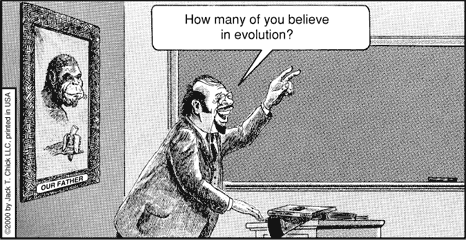


|
| Re: Darwin's Day by UyiIredia(m): 11:17am On May 31, 2012 |
jayriginal: Can Something Come from Nothing?
To most people, the claim that something cannot come from nothing is a truism. However, most physicists disagree. Against the claim, they often cite what are variously known as quantum vacuum fluctuations or virtual particles. These are particle-antiparticle pairs that come into existence in otherwise empty space for very brief periods of time, in agreement with the Heisenberg uncertainty relations. [Q1] [Q2] They produce measurable effects, such as the Lamb shift and the Casimir-Polder force.[Q3] [Q4] These particles are not anomalies; they are so common that some physicists argue that if we think of empty space as nothing, then there is no such thing as nothing, because space never is empty—it is always filled with virtual particles.[Q5] In short, if we follow most people in thinking of empty space as nothing, then we have at least one pervasive example of something that can come from nothing.
Can the Universe Come from Nothing?
Virtual particles are constrained to have short lives because they represent an increase in the energy of the universe; Heisenberg's uncertainty principle affords room for sufficiently short-lived virtual particles, but long-lived ones appearing in a universe such as ours would violate the first law of thermodynamics. One might think, then, that quantum vacuum fluctuations cannot have any relevance for the origin of the universe. On the contrary, some physicists, going back at least to Tryon (1973) believe that the entire universe might be a massive quantum vacuum fluctuation.[Q6] The key feature of the universe that would make this possible would be a total energy of zero. You might wonder how the universe could have a total energy of zero. The answer is that gravitational energy is negative—when summed with the positive energy of the matter in the universe, the two quantities may cancel out.[Q7] [Q8] Neither Heisenberg's uncertainty principle, nor the first law of thermodynamics, place any limit on the length of time a quantum vacuum fluctuation of zero total energy could persist, so the longevity of our universe does not rule out a quantum vacuum fluctuation origin.[Q9] The proposal is not that the entire universe appeared in one shot, but that a quantum vacuum fluctuation served as the seed for a local expansion of spacetime, which would automatically generate matter as a side-effect.[Q10] [Q11]
In these kinds of proposals, the quantum vacuum fluctuations occur in empty spacetime. Other proposals, most notably that of Alex Vilenkin, do not involve a preexisting spacetime at all, and rely upon quantum tunneling rather than vacuum fluctuation.[Q12]
Is the "Nothing" of the Physicists Really Nothing?
Now we come to an objection to all of the above. The objection is that when the physicists quoted refer to "nothing," they are, in fact, referring to something other than the literal absence of anything. To try to keep things as clear as possible, I will refer to the absence of anything as "nothingness." So, the contention is that the "nothing" of physics is not nothingness. Quote [Q5] may seem, at first glance, to bear this out. I contend that that is a misreading—Morris is just trying to say that space never is truly empty—but we need not get into an exegetical dispute here, since it is quite true that on Tryon-type models, the universe-producing quantum vacuum fluctuations occur in a preexisting spacetime.
What can one say about this challenge? There are two things to say:
(i) First off, the reason most people affirm the proposition that something cannot come from nothing is because they do not see things coming into existence out of the empty space around them. They are willing to equate empty space with nothingness. Hence, showing that particles do, and universes might, spontaneously arise from empty space, does address the intent behind popular claims that the universe could not have come into existence from nothing. Once one has shown that universes can arise from empty space, not many people will remain so secure about their metaphysical intuitions that they will insist that empty spacetime itself must have come from something.
(ii) Second, even if we do count spacetime as something, this would have no bearing on Vilenkin-type proposals. At this point, critics contend that Vilenkin's proposal requires quantum mechanics, and that the laws of quantum mechanics are "something." This is a strange claim, for two reasons: (1) It seems as though the critics wish to reify natural laws, which are not things, but just descriptions of the way things work. It is unclear why one should regard the fact (if it is one) that universes come into existence from time to time in a manner describable by quantum mechanics, as a thing. (2) If if one does count facts as things, then nothingness is a logical impossibility: if nothing existed, then it would be a fact that nothing existed, meaning that at least one thing (the fact that nothing exists) exists, which would, in turn, contradict the original hypothesis. Consequently, if one counts facts as things, then some fact must obtain; but, if at least one fact must obtain, why should it not be the fact that quantum mechanics applies?
Conclusion
I have not attempted to argue that the universe did come from nothing, or even to survey everything in cosmology or philosophy that bears upon the question of whether or not the universe was created. All I have attempted to do is to argue that an atheistic universe ex nihilo, in both a popular and a technical understanding of nihil, is possible. Even that modest step is bitterly contested by many theists, but modern physics appears to underwrite it decisively.
Full article --> http://www.infidels.org/library/modern/mark_vuletic/vacuum.html Wrong on one major count. The laws of quantum physics describe something. They aren't of themselves something. BTW, the author (not minding what he wrote in the conclusion) is claiming that something comes from nothing. An absurd statement. |
| Re: Darwin's Day by Kay17: 11:34am On May 31, 2012 |
^^^
First time I'm agreeing with Uyi. Nothingness is the simplest substance apart from reality, its simply void and lacks anything. Its easier to believe it existed prior to everything. However the presence of something negates nothing. |
| Re: Darwin's Day by OLAADEGBU(m): 11:48am On May 31, 2012 |
The Big Daddy (Contd.). 
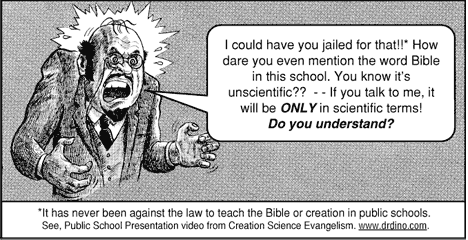
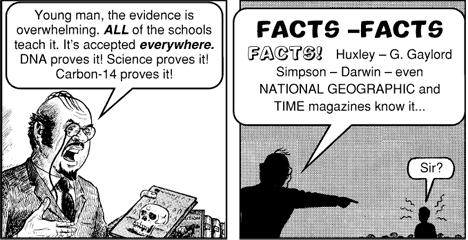
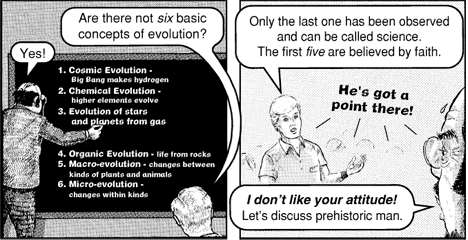
|
| Re: Darwin's Day by UyiIredia(m): 12:01pm On May 31, 2012 |
OLAADEGBU: The Big Daddy Those Evolutiionists bullies have also started with an anointed man, Ben Carson. See here. |
| Re: Darwin's Day by OLAADEGBU(m): 12:28pm On May 31, 2012 |
Uyi Iredia:
Those Evolutiionists bullies have also started with an anointed man, Ben Carson. See here.
Thanks for highlighting the double standards of the Darwin bulldogs. They are just shooting themselves in the foot because Darwin, their apostle stated that evolutionary thoughts have moral implications, and if they are to heckle Ben Carson for saying the same they might as well jettison Darwin's evolutionary ideologies. |
| Re: Darwin's Day by debosky(m): 4:28pm On May 31, 2012 |
Uyi Iredia:
Wrong on one major count. The laws of quantum physics describe something. They aren't of themselves something. BTW, the author (not minding what he wrote in the conclusion) is claiming that something comes from nothing. An absurd statement. I disagree - what he is claiming is that if you say there is 'nothing' and that's a fact, then the fact (that there is nothing) is in itself 'something'. Therefore even the 'something' that came from 'nothing' came from the fact that there is nothing, and this fact is something in itself.  The idea is quite difficult to grasp but I think I appreciate where he is coming from. I don't agree with his view that the laws/theories of physics prove that God could not have created the universe. Besides, who has defined what 'something' is?  I did tell Ola that there is a third possibility - the universe being created, the universe always existing and the universe coming into existence from a timeless hypersphere  Not that I believe the latter possibility, but it remains a possibility all the same. |
| Re: Darwin's Day by OLAADEGBU(m): 6:57pm On May 31, 2012 |
debosky:
I disagree - what he is claiming is that if you say there is 'nothing' and that's a fact, then the fact (that there is nothing) is in itself 'something'. Therefore even the 'something' that came from 'nothing' came from the fact that there is nothing, and this fact is something in itself. 
The idea is quite difficult to grasp but I think I appreciate where he is coming from. I don't agree with his view that the laws/theories of physics prove that God could not have created the universe.
Besides, who has defined what 'something' is? 
I did tell Ola that there is a third possibility - the universe being created, the universe always existing and the universe coming into existence from a timeless hypersphere 
Not that I believe the latter possibility, but it remains a possibility all the same. Aren't you stretching the truth here? I gave three options and you claimed that there is another option apart from the three possibilities I proposed. I said the universe was either eternal (always existed), or it created itself or that it had to be created. If you are saying that it came into existence from a timeless hypersphere you are still proposing that it is either created itself or that it is eternal, you have not said anything new. |
| Re: Darwin's Day by OLAADEGBU(m): 5:31pm On Jun 01, 2012 |
Big Daddy (Continued). 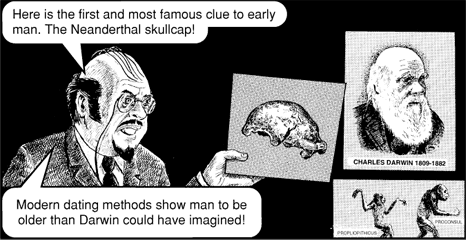
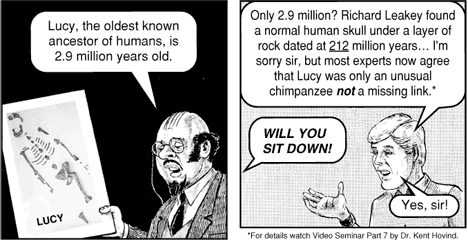
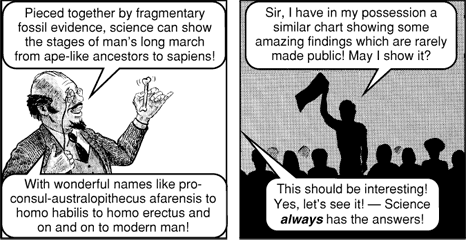
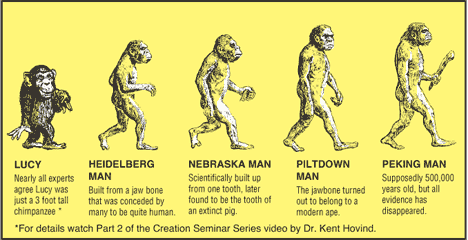
|
| Re: Darwin's Day by PAGAN9JA(m): 6:15am On Jun 02, 2012 |
^^^^^^^^^^^ [size=32pt]Olaadegbu you are a typical christian sly fraud!!!!![/size]in your evolution diagram you have only shown those discoveries that went wrong, because it suits your purpose and it was easy for you. you completely SKIPPED all the true discoveries to suit your vile purpose. THIS IS SCIENCE MAN. IT IS DONE BY TRIAL AND ERROR! SOME MISTAKE DO HAPPEN! are you saying these are also fake deformed humans        :  Homo Erectus  Homo heidelbergensis  Neandethral Man  Homo Floresiensis   Australopithecus  Paranthropus and there is more. . |
| Re: Darwin's Day by Nobody: 6:17am On Jun 02, 2012 |
^^^Gosh I dreaded taking that course. waste of my money. But my sexy lab instructor made it all better  |
| Re: Darwin's Day by debosky(m): 4:01pm On Jun 02, 2012 |
@ Jay The ironically funny aspect of the cartoon poster is that the 'evidence' offered for the claims in his cartoon are a 'video seminar' by 'Dr.' Kent Hovind, someone who just happens to be serving a 10 year jail sentence for tax evasion?  Heck, video seminars are now the way to establish the veracity of scientific claims, not detailed research papers that have been peer reviewed.  This same Hovind has 'degrees' all from unaccredited schools and is the source of credible evidence? Someone whose 'university' allows people to get doctorate degrees in months?  Not only does this 'Dr' Hovind specialise in 'young' earth creationism, he specialises in 'young' degree creationism and tax avoidance too. Furthermore, this guy believes the mammoths were 'frozen' in place during the flood by some mysterious 'snow meteor' no less.  Even worse, Ola's favourite website AiG even criticises this same Hovind because of his silly arguments.  Dunno about you, but I'd hesitate accepting pseudo-scientific nonsense from a so called 'Dr' who couldn't even understand his own taxes.  |
| Re: Darwin's Day by Nobody: 6:01pm On Jun 02, 2012 |
|
| Re: Darwin's Day by OLAADEGBU(m): 9:37pm On Jun 02, 2012 |
|
| Re: Darwin's Day by OLAADEGBU(m): 9:40pm On Jun 02, 2012 |
This is how "Christians" shoot themselves in the foot. 
|
| Re: Darwin's Day by OLAADEGBU(m): 9:51pm On Jun 02, 2012 |
|
| Re: Darwin's Day by OLAADEGBU(m): 9:54pm On Jun 02, 2012 |
Big Daddy (Continued).
Let's see the lies that are being taught to students in the public educational systems in the western world that our people are swallowing hook, line and sinker thinking that they are studying science. 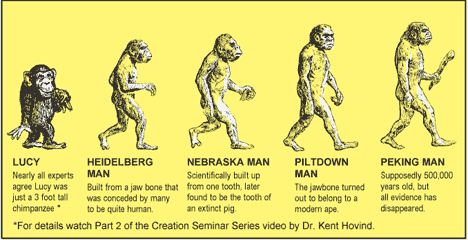
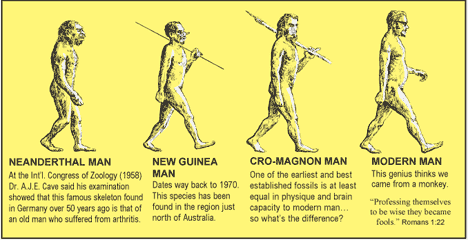

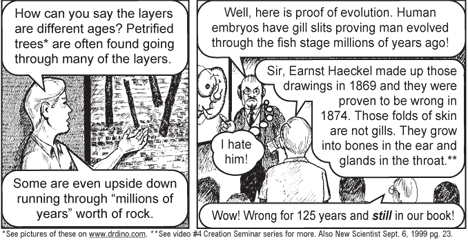
|
| Re: Darwin's Day by debosky(m): 11:07pm On Jun 02, 2012 |
OLAADEGBU:
What you are doing here is a good example of a logical fallacy called Circumstantial Ad hominem. How does his conviction detract from the scientific claims he made? When even AiG don't believe the nonsense this guy is spewing, I don't have to bother trying to 'detract' from his clearly dubious scientific claims. http://creation.com/maintaining-creationist-integrity-response-to-kent-hovind
I know it is easy to hit a person when he is down, but you are yet to debunk any of his claims with objective evidences. Your likes accused Jesus Christ for evading taxes and Daniel suffered the same persecution just as Ben Carson is now getting from your comrades.
Correction - Jesus paid his taxes unlike your discredited, fraudulent 'Dr'. Carson's opinion is being challenged - that isn't persecution, it's a difference of opinion, which, last I checked, is allowed without being called persecution. If someone lacks personal integrity, it brings his motives into question - someone like Kent who claims the US government is hiding the cure for cancer cannot be regarded seriously by anyone. |
| Re: Darwin's Day by OLAADEGBU(m): 1:14am On Jun 03, 2012 |
debosky:
When even AiG don't believe the nonsense this guy is spewing, I don't have to bother trying to 'detract' from his clearly dubious scientific claims.
http://creation.com/maintaining-creationist-integrity-response-to-kent-hovind
This is what we are saying, when you accuse AiG of dissing Kent Hovind and you went on to post a link of another creationist website CMI as your evidence. Don't you see that you are the one making spurious claims? debosky:
Correction - Jesus paid his taxes unlike your discredited, fraudulent 'Dr'.
If someone lacks personal integrity, it brings his motives into question - someone who claims the US government is hiding the cure for cancer cannot be regarded seriously by anyone.
Even though Jesus wasn't supposed to pay he had to fulfill all righteousness especially when the Sad-you-sees and Far-to-sees came pointing their accusing fingers forgetting that the remainer of their crooked fingers were pointing at their behinds. |
| Re: Darwin's Day by jayriginal: 10:50am On Jun 03, 2012 |
Hi Debosky,
Entertain no fears on my part. I am not moved.
I understand some people do not mind where the source of their information comes from.
Credibility is not important to them. Their only requirement is that their beliefs are supported.
Peer reviewed papers have no weight as long as they are against them. |
| Re: Darwin's Day by PAGAN9JA(m): 3:05pm On Jun 03, 2012 |
OLAADEGBU:
The "missing link" are still missing. That is why evolutionists had to resort to tall tales (reconstructions you have up there) so as to fit in the "gap" to say that we descended from ape-like creatures. We are all created in God's image and are all from the biblical Eve, not the African Eve. Those who expose these frauds are being persecuted and denied so as to keep the likes of you in perpetual darkness and deceit. this is why I HATE CHRISTIANITY!     you people are so filled with false pride and ego.  [size=32pt]YOU ARE SO STEEPED IN MAN WORSHIP, THAT YOU THINK EVEN GOD LOOKS ONLY LIKE MAN![/size] [size=32pt]YOU ARE SO STEEPED IN MAN WORSHIP, THAT YOU THINK EVEN GOD LOOKS ONLY LIKE MAN![/size]
YOU DISGUST ME.  there are other creatures on this planet. we are all made equal. . |
 Just to annoy Deep Sight a little, your pal, Prof Stenger.
Just to annoy Deep Sight a little, your pal, Prof Stenger.








 :
: 


















